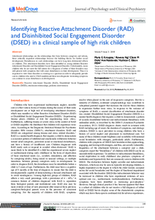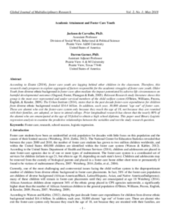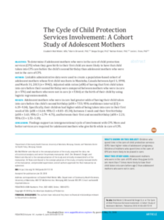This page contains documents and other resources related to children's care in the Americas. Browse resources by region, country, or category.
Displaying 871 - 880 of 1438
This article draws on survey data gathered from young people in El Salvador who participate in Youth Outreach Centers to address gaps in evidence on pre-migration context and the effectiveness of in-country youth development programs thought to deter them from migrating.
This study used ethnographic data to examine a program providing subsidized apartments to youth aging out.
This study examined data from five cycles over twenty years of Ontario Incidence Studies (-1993, -1998, -2003, -2008, -2013) to provide a profile of child welfare workers.
This descriptive study involved caregivers and their adopted children, under the age of 7 years old, referred by pediatricians to an outpatient clinic, which specializes in early mental health. The prevalence of toxic stress, measured as symptoms of Reactive Attachment Disorder (RAD) and Disinhibited Social Engagement Disorder (DSED), was explored using clinical data collected during initial assessment.
This research study proposes to explore aggregate of factors responsible for the academic struggles of foster care youth.
This study was conducted to determine if adolescent mothers who were in the care of child protection services (CPS) when they gave birth to their first child are more likely to have that child taken into CPS care before the child’s second birthday than adolescent mothers who were not in the care of CPS.
The primary aim of the current study was to examine the longitudinal effects of ongoing physical abuse on the co-development of externalizing behavior problems and posttraumatic stress (PTS) symptoms among child welfare-involved adolescents.
This paper uses person-centered latent class analysis (LCA) methods to examine the relationship between different profiles of ACE exposures and divergent health trajectories amongst this high-risk population.
The authors of this paper argue that young migrants without legal documentation are urgently in need of our attention as child and youth care workers and scholars.
The authors of this paper conducted a systematic review with the aim of developing a better understanding of the psychosocial factors associated with the behavioral health of children in foster and kinship care.




